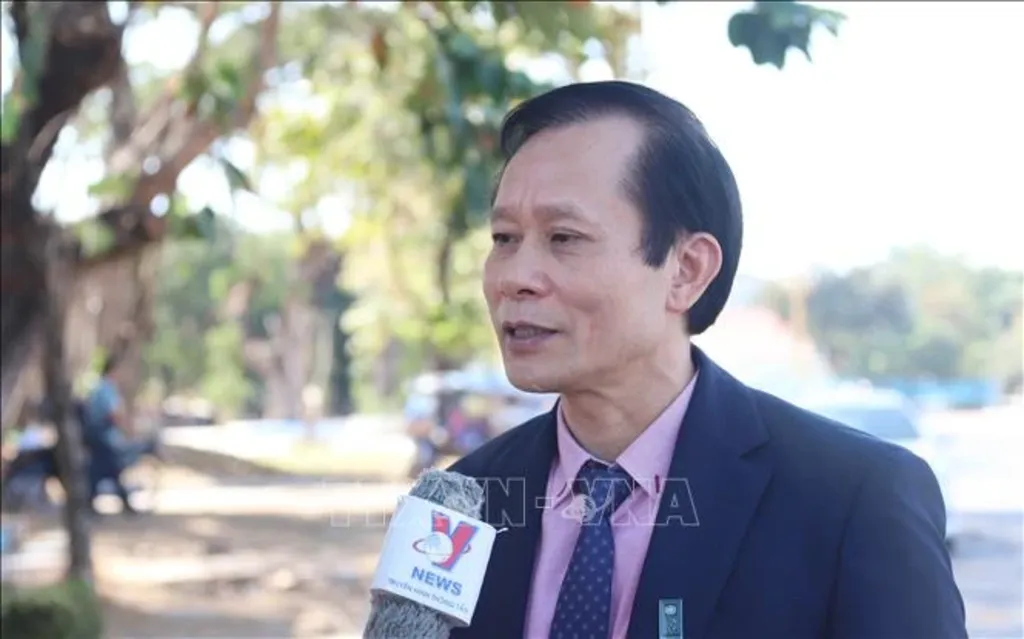 |
| Deputy Resident Representative of the United Nations Development Programme (UNDP) in Laos Dao Xuan Lai __Photo: VNA |
Vietnam has achieved positive results in socio-economic development and foreign affairs in 2024 despite global uncertainties, said Deputy Resident Representative of the United Nations Development Program (UNDP) in Laos Dao Xuan Lai.
Speaking to the Vietnam News Agency (VNA)'s resident reporters in Laos, Lai said that Vietnam has made significant breakthroughs, transforming its economic thinking from a planned economy to a socialist-oriented market economy. This shift is a key factor for the success of Vietnam's economy.
After nearly 40 years of renewal, Vietnam's economy reached USD 430 billion in 2023, placing it among the 40 largest economies in the world and specifically within the top five economies in the Association of Southeast Asian Nations (ASEAN). The per capita GDP has approached USD 4,300, and the multidimensional poverty rate has dropped to 2.9 percent. These are encouraging results, especially as Vietnam started as an underdeveloped agricultural economy with GDP of USD 26.3 billion in the 1980s.
Vietnam has integrated extensively on the international market, transforming itself into one of the most open economies in the world. The country has established economic and trade relations with 230 countries and territories. It has participated in over 500 bilateral and multilateral agreements, including 17 free trade agreements.
This is a very positive signal, Lai said, noting that Vietnam's total import-export turnover is projected to reach USD 800 billion this year, double its GDP, with focus on attracting foreign investment. Vietnam has attracted approximately USD 31.4 billion in foreign direct investment (FDI) in the first 11 months of 2024, especially in the processing and manufacturing sectors.
Regarding the economic growth model, Vietnam has shifted its focus from the agricultural sector to services and industrial production. The shift will help increase the value added to the economy and its economic sectors. Importantly, Vietnam’s economy ensures inclusive development enabling people and businesses, especially small- and medium-sized enterprises to benefit from economic activities.
Regarding international integration and diplomacy, Lai affirmed that Vietnam has made advancements. The Party, National Assembly (NA), Government, and people of Vietnam are implementing an independent and comprehensive foreign policy imbued with characteristics of the “bamboo diplomacy”.
Vietnam has established increasingly deeper relations with all 193 countries that are members of the United Nations (UN), including special ties with three countries, comprehensive strategic partnerships with five countries, and strategic partnerships with 13 countries, Lai noted.
Meanwhile, the Vietnamese NA is also a member of parliamentary unions in Asia and the world. The Vietnam Fatherland Front and various Vietnamese organizations are actively involved in practical foreign cooperation mechanisms with 1,200 people's organizations and foreign partners worldwide.
Lai praised Vietnam's positive and responsible role as an UN member state, particularly through its involvement in UN peacekeeping operations.
He emphasized that in the coming time, Vietnam should continue to maintain political stability, macroeconomic stability, and social order to build trust with other countries, as well as with international investors.
Lai also suggested that Vietnam should focus on enhancing labor productivity and establish mechanisms and policies to promote innovation, technological research and development. Vietnam needs to pay attention to promoting green economy and renewables.- (VNA/VLLF)









